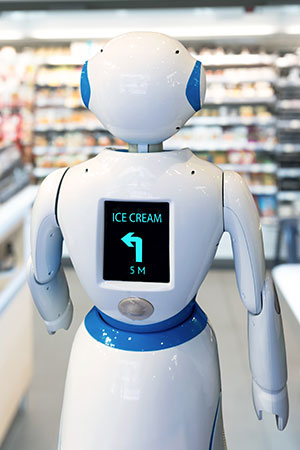There has been a lot of debate on how artificial intelligence (AI) will shape our future. Will autonomous AI-enabled machines with sleek human form be a negative and unbridled force (Terminator style), or will the development of AI improve the wellbeing of our customers, businesses and community for the better?
Top experts from The University of Queensland (UQ) Business School’s Research Hubs take a futuristic focus to identify how key AI trends and current research can help predict what the world might look like from 2030 to 2050.
How AI will improve health care in 2030
Prediction 1: By 2030, AI will allow for earlier detection and diagnosis of some of our leading causes of disease, and we’ll see greater use of at-home health monitoring devices.
 UQ’s Future of Health research hub predicts the growing reliance on hospital care in Australia and many other countries is unsustainable. Yet, through the intelligent use of AI, health services can provide individuals and families with new tools to monitor healthcare at home.
UQ’s Future of Health research hub predicts the growing reliance on hospital care in Australia and many other countries is unsustainable. Yet, through the intelligent use of AI, health services can provide individuals and families with new tools to monitor healthcare at home.
AI will be used to prevent health problems occurring (through tools such as advanced AI prediction applications, virtual nursing assistants and smart wearable devices), detect health issues when they occur, and reduce unnecessary hospital visits.
“By 2030, we’ll see a substantial uptake of these tools by individuals as well as the public and private sectors”, says Future of Health expert Associate Professor Nicole Hartley.
- patients’ full genomic data
- integrated health-service data (including new AI diagnostics systems such as retina analysis tools to diagnose diabetes, dermatology AI apps used to detect skin cancer etc.)
- personal health data from the patient from real-time monitoring devices.
“If health services can access and integrate all three data sources, they will have the ability to understand both populations and individuals with a level of granularity never before possible”, Nicole says.
“Clinicians will also be able to detect more health issues with increased accuracy, which will enable them to predict and treat conditions far earlier than ever before.”
While many benefits could stem from AI developments, such as cost efficiencies and improved quality of life, Nicole cautions that we need to be aware of, and effectively manage potential unintended consequences. These could include breaches of privacy and reinforcement of biases on disadvantaged populations.
“AI could radically change patient diagnosis, treatment and the future of health more generally by 2030”, Nicole says. But to get there, it’s important all stakeholders, patients, clinicians and health care providers understand and accept AI.
The big role AI will play in business sustainability from 2030 to 2040
Prediction 2: AI will make it possible for nearly all businesses to run a carbon-neutral enterprise from 2030 to 2040.
While AI may conjure up ideas of autonomous robots and supercomputers the size of a USB, one of the biggest opportunities for AI to positively impact the world is through business and environmental sustainability efforts.
According to UQ’s Business Sustainability Initiative research hub, the ability for AI to integrate across systems to process mass amounts of data in real-time, highlighting risk, inefficiency and unnecessary wastage, will change the game for sustainability.
For example, as early as 2030, AI will have a significant impact on the environment, communities and an organisation’s bottom line. A Microsoft and PWC report highlights that AI used in sustainability-related contexts could add up to $5.2 trillion USD to the global economy in 2030.
According to business sustainability expert Dr Belinda Wade, AI will provide tremendous opportunities from 2030 onwards to work towards a more circular and efficient economy.
“You will see a lot of smart systems optimised for product demand, producing outputs in a way that is less wasteful both financially and environmentally,” says Belinda.
 “AI will detect continuous operational improvements. For example, conveyors will only run when they are required, reducing energy use, and systems will be able to plan for consuming materials only when they are needed. These sort of capabilities are available now, but there is a lot of planning required. AI will make this way of working seamless.”
“AI will detect continuous operational improvements. For example, conveyors will only run when they are required, reducing energy use, and systems will be able to plan for consuming materials only when they are needed. These sort of capabilities are available now, but there is a lot of planning required. AI will make this way of working seamless.”
Interface is one organisation that the Business Sustainability Initiative has identified that are already living in the sustainable future by providing carbon-neutral flooring solutions.
“Interface set ambitious zero targets in many areas: waste to landfill, fossil fuel energy use, processes, water use and greenhouse gas emissions,” says Belinda.
“Yet, achieving carbon neutral and even carbon positive outcomes required a lot of bespoke systems and manual review of processes, supply chains and even their labour force. AI from 2030 to 2040 will likely be able to identify and automate this level of efficiency and reduction of wastage for all businesses.”
Belinda believes that with AI supporting sustainability, there might even be an opportunity for more manufacturing to decentralise and move back to origin countries.
“Manufacturing is a big area that AI could positively impact. If we are using it to manage efficiency and resources, AI could greatly minimise costs and allow local manufacturing to be effective,” says Belinda.
Read more: How businesses can build resilience and gain a competitive edge
How AI will impact Trust Ethics and Governance by 2035
Prediction 3: Organisations will be required to provide transparent reports on how they govern and assure their ethical use of AI and data, and will be held responsible for trust breaches.
While AI systems present exciting opportunities to support data-driven and efficient decisions, they do not come without risks to individuals and society. How will organisations manage these challenges and create trustworthy AI?
A recent 5-country research project led by trust experts Professor Nicole Gillespie, Dr Steve Lockey and Dr Caitlin Curtis surveyed over 6000 people and revealed strong community endorsement for the principles and practices of trustworthy AI.
“The report also showed that most people are more willing to use AI when there are mechanisms in place to assure AI is being developed and used in a trustworthy manner”, says Nicole. Examples of this assurance include AI ethical review boards, AI codes of conduct, and adherence to standards.
AI systems and their applications are constantly evolving and so is the regulatory landscape in which they operate. Algorithmic Impact Assessment tools and AI Ethical Codes of Conduct are already being encouraged and used in several jurisdictions, including Canada and Europe. Since 2018, Europe’s General Data Protection Regulation (GDPR) requires transparency and safeguards over the use of personal data, with similar regulation subsequently being introduced in several other jurisdictions.
This year, the United States Federal Trade Commission published guidelines for ‘truth, fairness, and equity’ in AI use, and the European Commission released its recommendations for AI regulation. Both stress the need for transparent AI accountability. In fact, the US guidelines go so far as to say: “Hold yourself accountable – or be ready for the FTC to do it for you.”
UQ’s Trust Ethics and Governance Alliance research hub predicts that by 2035, organisations will be required to provide transparent reports on their use of AI and data and will be held to high ethical standards. They say you can prepare for this future by:
- Proactively putting in place the appropriate guardrails and governance mechanisms to ensure your organisation’s use of AI systems adheres to the principles of trustworthy AI.
- Keeping abreast of emerging best practices in AI governance, such as establishing AI ethical review boards and codes of conduct on AI and data ethics.
- Investing in a digital savvy and AI literate workforce by educating employees – this enables them to better identify and manage ethical concerns and potential risks, as well as better seize the opportunities of responsibly using AI.
- Embracing transparency, independent oversight, and accountability (e.g. by conducting and publishing independent audits, and opening up source code for independent inspection).
Discover: Lead AI and digital transformation with a Master of Business Analytics
How AI will revolutionise service innovation up to 2050
Prediction 4: By 2050, AI technology will read emotions to personalise each customer experience, and everyday interactions will be a mix of humans, AI-enabled machines and hybrids.
 The UQ Service Innovation Alliance research hub looks forward to 2050 to envisage a world functioning with AI in many forms, including robots. Service Innovation expert, Professor Janet McColl-Kennedy, shares some predictions based on current studies.
The UQ Service Innovation Alliance research hub looks forward to 2050 to envisage a world functioning with AI in many forms, including robots. Service Innovation expert, Professor Janet McColl-Kennedy, shares some predictions based on current studies.
“The norm will be that customers and employees will interact with a mix of humans, machines and hybrids. Virtual assistants will be commonplace,” says Professor McColl-Kennedy.
“AI-enabled robots will be the norm and Next-generation robots will offer advantages to organisations, especially where tasks are simple and routine on one hand, or cognitively complex on the other.”
“Machines can do work that humans don’t want to do, such as “dirty” work like cleaning up bodily fluids, or “dangerous” work such as detecting and detonating problematic devices."
Whether AI-robots will be accepted in more lifelike forms depends on whether the customer wants a deep or shallow interaction with the frontline staff member and whether customers’ emotional needs must be met.
“There is evidence to suggest that we are willing to be served by robots if it makes for a more streamlined and customised experience, or in situations where it is embarrassing to be in close contact with another human, such as bathing or toileting,” says Janet.
“In 2050, people aged 65 years and older will outnumber children five years and under, which will see opportunities for AI and robots, not only in the service of healthcare, but in companionship and support of everyday tasks.”
Digital technologies will enable hyper-personalised experiences based on established patterns of behaviour and preferences, and machines will get smarter about doing this.
“In the future, increased usage of AI technology will provide insights into people’s emotions – Sensors will be able to pick up facial expressions and through AI can sync with other data sources from a customer to alert an organisation as to how the individual customer is feeling, so they personalise offerings in real-time and make experiences engaging and seamless,” says Janet.
According to the Service Innovation Alliance, sophisticated wearable technologies, such as advanced forms of Fitbit will be ubiquitous, and both customers and organisations will effortlessly move between the physical (interactions with humans and machines in brick and mortar facilities) and virtual environments.
Organisations in turn, should be much better able to provide customers with what they want, identifying and sourcing the products and services that best meet the customer’s expectations and facilitating more meaningful customer experiences.
Final thought
Based on the predictions of the UQ Business School research hubs, AI has exponential possibility to improve so many parts of our lives for the better in 2030 and beyond. Yet, for organisations to shape AI into a positive force, they need to provide clear, transparent governance and a strong code of ethics before they allow AI to ‘virtually bloom’ to its full potential.
Subscribe to Momentum and keep up with the latest research insights, business thinking and expert opinions.

